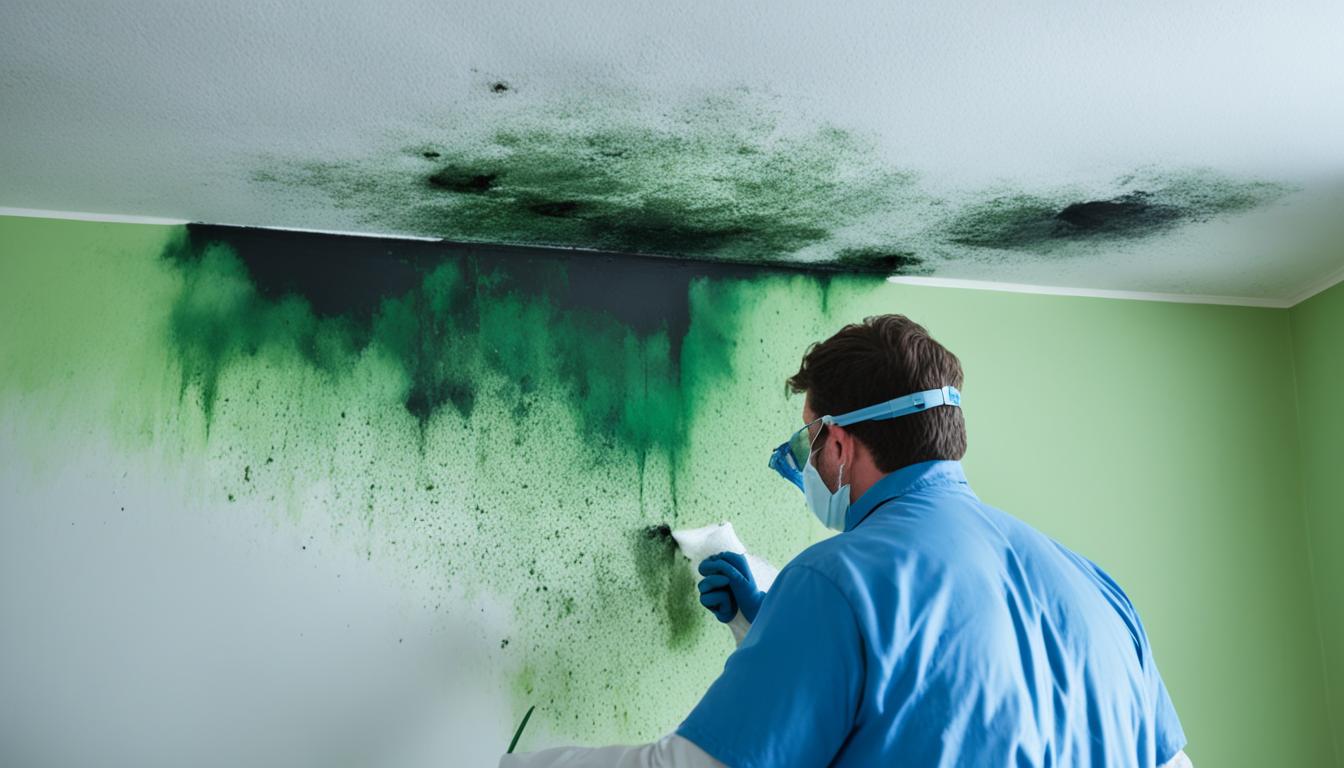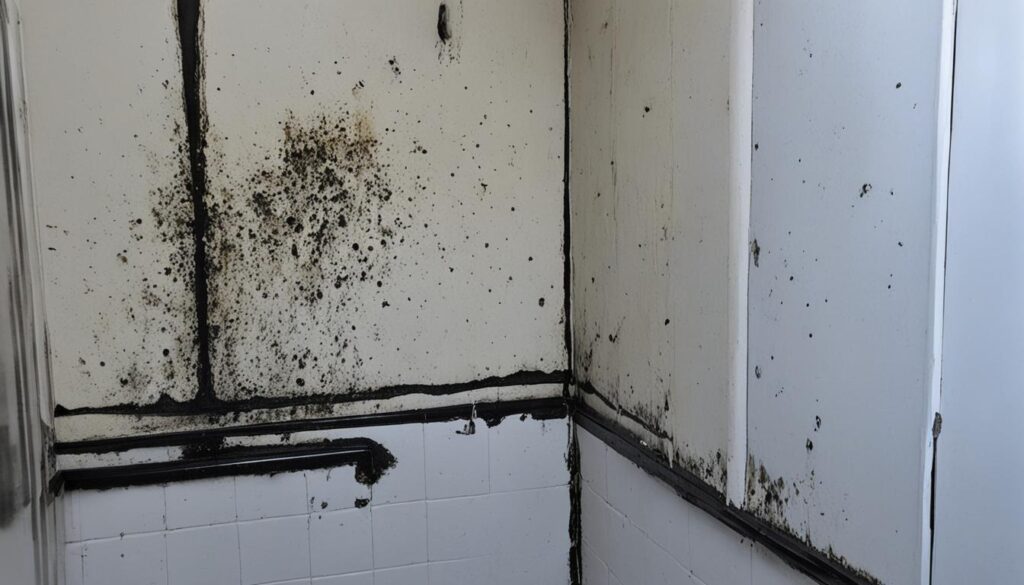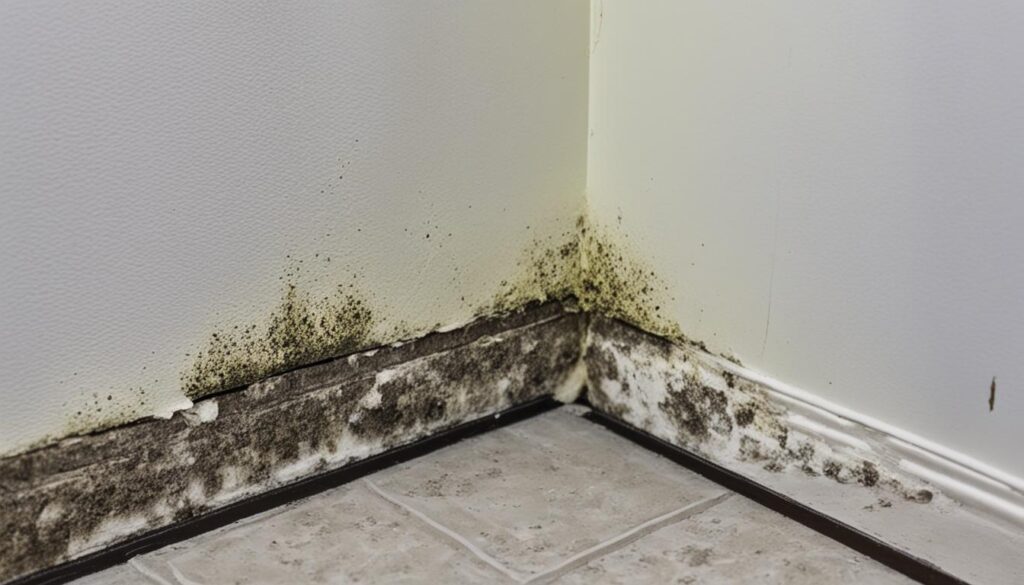
Landlord Won’t Fix Mold Issue? Your Rights & Steps
Are you dealing with a mold problem in your rental property, but your landlord refuses to address it? This can be a frustrating situation, but it’s important to understand your rights as a tenant and take the necessary steps to address the issue. Mold can pose serious health risks and even cause damage to your rental property, so it’s crucial to take action.
In this section, we will explore what you can do if you find yourself facing a mold issue and your landlord is unwilling to fix it. We will discuss your tenant rights regarding mold problems, the potential health hazards associated with mold, and the responsibilities that landlords have when it comes to addressing these issues in rental properties.
Key Takeaways:
- As a tenant, you have the right to a safe and habitable living environment, free from mold issues.
- Mold can pose health risks, such as respiratory problems and allergies, so it’s important to address the issue promptly.
- Landlords have a responsibility to address mold problems in rental properties and make necessary repairs.
- Document the mold problem and communicate with your landlord about the issue in writing.
- If your landlord fails to address the mold issue, you may need to take legal action or seek assistance from professional mold remediation services.
Understanding Your Rights and Responsibilities
When facing a mold issue in your rental property, it’s crucial to be aware of your rights as a tenant and understand your responsibilities. By having a clear understanding of the legal framework surrounding tenant rights and responsibilities related to mold problems, you can take the appropriate steps to protect your health and seek resolution. Let’s delve deeper into these key considerations.
Rental Agreements and Mold Repair
One of the first essential aspects to consider is your rental agreement. A well-drafted and comprehensive rental agreement can help establish the responsibilities of both you as a tenant and your landlord when it comes to mold issues.
Take the time to review your rental agreement thoroughly. Look for clauses that explicitly outline the landlord’s obligations to address mold problems and ensure a safe and habitable living environment. If these clauses are missing or ambiguous, it’s essential to communicate with your landlord to address the issue and clarify their responsibilities.
| Tenant Rights Related to Mold Issues: | Landlord Responsibilities: |
|---|---|
|
|
Tenant Mold Dispute Resolution
If your landlord is unresponsive to your mold concerns or fails to take appropriate action, you may need to address the issue through legal channels. Tenant mold dispute resolution typically involves the following steps:
- Document the mold problem: Take written notes, photographs, and videos of the mold issue and its impact on your rental property. This documentation will be crucial evidence if legal action becomes necessary.
- Communicate with your landlord: Send a written notice to your landlord, clearly stating your concerns, referencing the relevant clauses in your rental agreement, and requesting prompt and effective mold remediation.
- Seek professional mold inspection: If your landlord fails to take action, consider hiring a professional mold inspector to assess the extent of the problem and provide an expert opinion on the necessary remediation.
- Consult a tenants’ rights organization or attorney: If all attempts to resolve the issue amicably fail, seek guidance from a tenants’ rights organization or consult with an attorney specializing in landlord-tenant disputes.
- File a complaint or initiate legal action: Based on the advice of your attorney or tenants’ rights organization, you may need to file a complaint with the appropriate housing authorities, pursue mediation or arbitration, or initiate legal proceedings to protect your rights and seek a resolution.
Remember, tenant mold dispute resolution can be complex, and specific procedures may vary depending on your location and the details of your case. It’s crucial to consult with professionals who can guide you through the legal process.

Taking Action to Address the Mold Issue
If you are facing a mold issue in your rental property and your landlord is unwilling to address it, there are steps you can take to address the problem on your own before considering legal action.
- Document the Mold Problem: Start by documenting the mold issue in your rental property. Take clear photographs or videos of the affected areas, making sure to capture the extent of the mold growth.
- Conduct a Mold Inspection: It is essential to conduct a thorough mold inspection to determine the type and severity of the mold problem. Consider hiring a professional mold inspector who can assess the extent of the mold growth and identify any hidden mold sources. A comprehensive mold inspection will help you gather evidence to support your case.
- Understand Health Concerns: Black mold, in particular, can pose serious health risks to you and your family. Exposure to black mold can lead to respiratory issues, allergic reactions, and other health problems. It is crucial to be aware of the potential health concerns associated with black mold exposure.
- Communicate with Your Landlord: Reach out to your landlord to discuss the mold issue. Present your documented evidence and findings from the mold inspection. Clearly explain the health risks associated with black mold and express your concerns. It is important to maintain open and effective communication with your landlord throughout the process.
- Seek Resolution: If your landlord still refuses to address the mold issue, you may need to consider legal action. Consult with an attorney specializing in landlord-tenant disputes to understand your options and rights. They can guide you through the process of taking legal action to resolve the mold problem.
Remember, taking action to address the mold issue in your rental property is crucial not only for your health and well-being but also for preserving the integrity of the property. By documenting the problem, conducting a mold inspection, understanding health concerns, and effectively communicating with your landlord, you are taking important steps towards finding a resolution.

Understanding Mold Inspections
A professional mold inspection involves a comprehensive assessment of your rental property to identify any areas affected by mold growth. During the inspection, the mold inspector will visually examine the property, take samples for laboratory analysis, and provide a detailed report with recommendations for remediation. A thorough mold inspection will help you gather evidence, understand the severity of the issue, and make informed decisions about addressing the mold problem.
| Benefits of a Mold Inspection | Importance for Legal Action |
|---|---|
| Detects hidden mold sources | Provides documented evidence |
| Identifies the type of mold present | Strengthens your case |
| Assesses the extent of mold growth | Establishes the severity of the issue |
| Pinpoints areas requiring remediation | Guides the legal process |
Conclusion
Dealing with a stubborn landlord who refuses to fix mold issues in your rental property can be incredibly frustrating. However, it is crucial to understand your rights as a tenant and take appropriate action to address the problem. Mold not only poses serious health risks but also compromises the structural integrity of your home.
If you are facing a mold problem in your rental property, don’t hesitate to seek professional assistance. Contact Fix Mold Miami at 305-465-6653 for expert mold assessment and remediation services. Their team of experienced professionals can help identify the extent of the mold damage and provide effective solutions to restore your home to a safe and habitable condition.
By taking the necessary steps to address the mold problem promptly, you can protect both your health and the value of your rental property. Remember, your well-being is important, and you have the right to live in a healthy and safe environment. Don’t hesitate to assert your rights and seek support when necessary.




